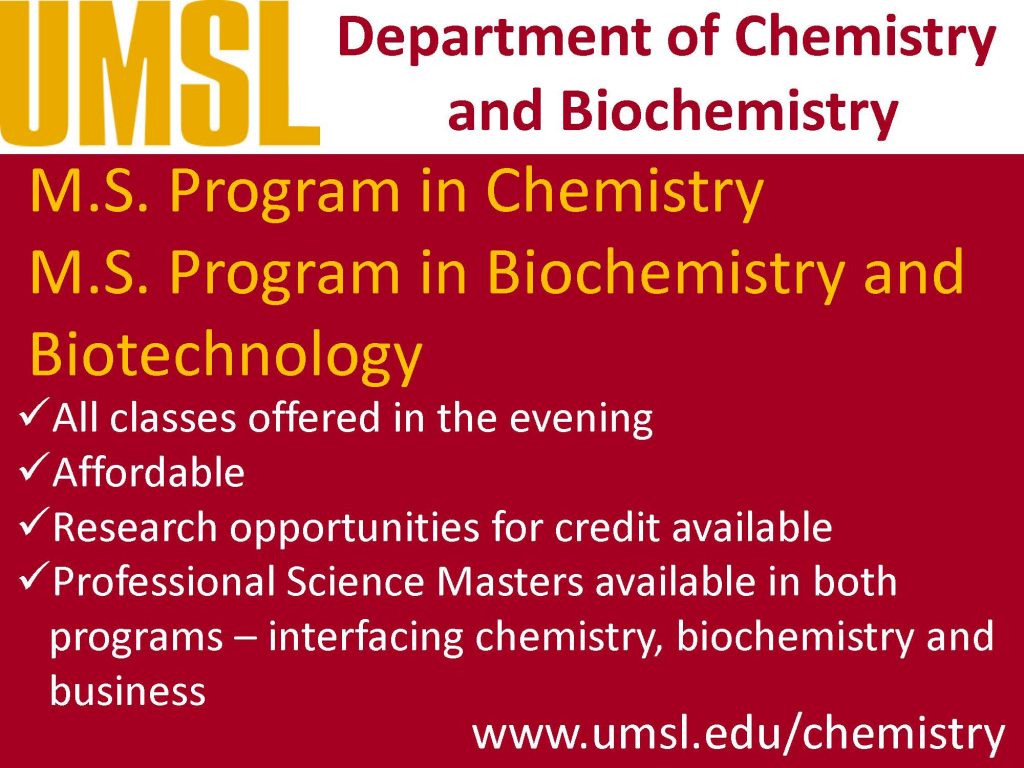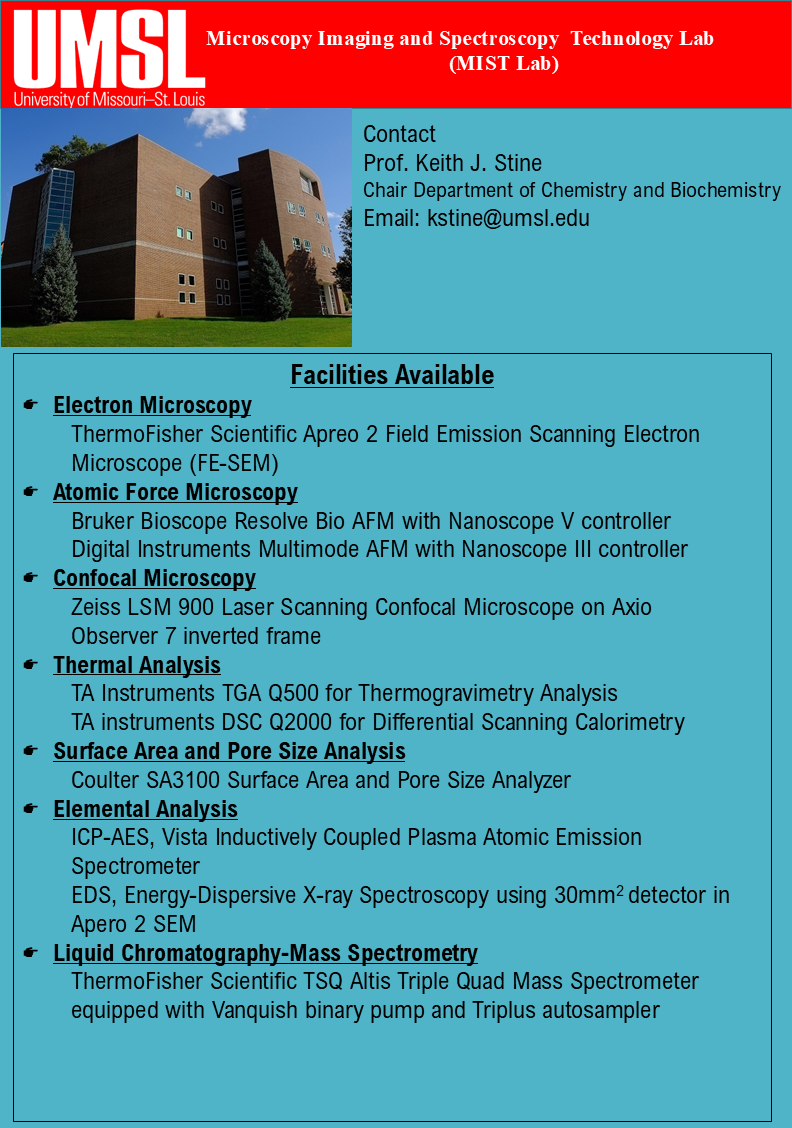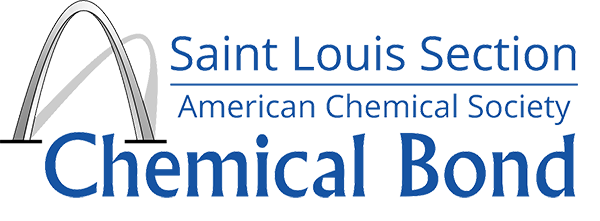
Vol. 76, No. 9, December, 2025
- Calling All Outstanding High School Chemistry Teachers! 10 November 2025
 The St. Louis Section of the American Chemical Society is seeking nominations for the 2026 High School Chemistry Teaching Award. This award is given to recognize and encourage outstanding teachers of high school chemistry within the St. Louis Section. The award winner will receive a $900 check and a plaque, presented at an awards dinner and program in Spring.
The St. Louis Section of the American Chemical Society is seeking nominations for the 2026 High School Chemistry Teaching Award. This award is given to recognize and encourage outstanding teachers of high school chemistry within the St. Louis Section. The award winner will receive a $900 check and a plaque, presented at an awards dinner and program in Spring.Please consider nominating a teacher in the Greater St. Louis Area who exemplifies excellence in the teaching of high school chemistry.
The nomination must include the following items:
1) The Nominee Information Form should be completed.
2) A curriculum vitae or résumé that includes a list of the nominee’s
honors, professional activities, and additional evidence of service to the
profession must be sent to acsawardstl@gmail.comAt least one recommendation must be from the nominee’s current principal or supervisor. Additional recommendations may be completed by colleagues,
members of the American Chemical Society who are familiar with the nominee’s achievements, former students, or parents of former students.All materials must be submitted by January 30, 2026.
Please address any questions to Rob Lamb at acsawardstl@gmail.com
- The Continuity Dinner … on a Tuesday? 30 November 2025
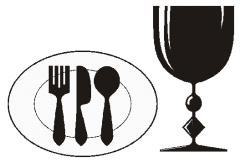 Yes, Tuesday, December 9th, in fact.
Yes, Tuesday, December 9th, in fact.Our traditional end-of-year celebration, including very brief business meeting, passing of the gavel to the new slate of officers, preview of the Distinguished Service Award (conferred in the spring), and the Henry Godt Memorial Lecture (a light-hearted look back at the year past). If you’re not a regular ACS meeting attendee, come renew or create acquaintances. There are almost always some new and old members whom we see only at this event. It will be a great opportunity to network and learn how to get more involved in the section.
Tuesday, December 9, 2025, 6 – 9 pm
Favazza’s on the Hill
5201 Southwest Avenue
Saint Louis, MO 63139RSVP to Elizabeth Bergman, Chair of the Section by December 5th. Cost for this event is $35 for members/+1s/family, $45 for non-members, $15 for students. We need an accurate count for the restaurant, so be sure to tell us you (and how many others) are coming.
All officers and committee chairs please submit any agenda items and/or “can’t be there” reports by December 5th as well.

Board of Directors
St Louis Section–ACS Board of Directors meets the second Thursday of each month, usually over Zoom. E-mail chair@stlacs.org for the Zoom link to the next meeting.
Date: November 11th
Join internet meeting at 6:00 pm for social/chit-chat
Business meeting begins at 6:30 pm
Future meetings: January 8th, February 12th
Maryville University
Seminars are approximately once a month on Thursdays, 4-5 pm. Details are available on the university’s seminar page. All seminars are free and open to the public. Contact Jason Telford for more information.
Saint Louis University
Seminars are generally on Fridays at 12 noon in Carlo Auditorium, Tegeler Hall, unless noted otherwise. Refreshments follow. For the most up-to-date information, refer to the department’s home page and follow the link to the Seminar Schedule.
University of Health Sciences & Pharmacy in St. Louis
The Center for Clinical Pharmacology hosts a monthly seminar series in ARB 212 unless otherwise noted. For the most up to date information refer to the center’s seminar page or contact Jodi Maslin.
University of Missouri–St Louis
Mondays at 4 pm in 451 Benton Hall, unless otherwise specified. Refreshments 15 minutes prior to seminar time. For timely information on visiting seminar speakers, contact the Chemistry Department, 314.516.5311, or visit the seminar schedule. The department has additional seminar series which are also accessible from this page.
Washington University
Seminars are in McMillen 311 at 4 pm unless otherwise noted. For information, consult the departmental events page. Related seminars, including endowed seminar series and the WU med school biochemistry series, are linked here as well.
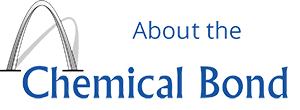
The Chemical Bond is published at www.stlacs.org January through May and September through December by the St Louis Section–American Chemical Society. If you would like to receive email notification when each issue is posted, you can subscribe to our email list and join the “Chemical Bond reminders” group.
Correspondence, letters to the editor, etc., should be emailed to editor@stlacs.org or mailed ℅ St Louis Section–ACS, PO Box 410192, Saint Louis, MO 63141-0192.
Copyright © 2025 American Chemical Society and the St Louis Section–ACS
| Editor | JB Carroll | . editor@stlacs.org |
| Associate Editor | Eric Ressner | 314.962.6415 editor@stlacs.org |
| Assistant Editor & Advertising Manager | Keith Stine | 314.516.5346 advmgr@stlacs.org |
| Business Manager | Donna Friedman | 314.513.4388 bizmgr@stlacs.org |

